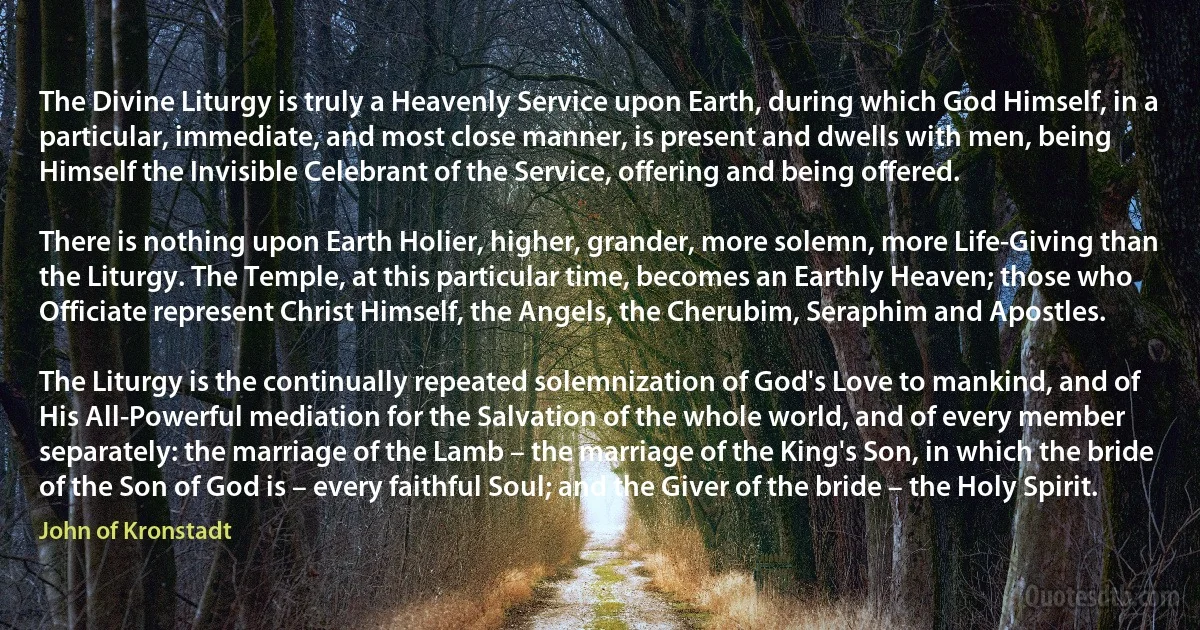
Тhe Divine Liturgy is truly a Heavenly Service upon Earth, during which God Himself, in a particular, immediate, and most close manner, is present and dwells with men, being Himself the Invisible Celebrant of the Service, offering and being offered. There is nothing upon Earth Holier, higher, grander, more solemn, more Life-Giving than the Liturgy. The Temple, at this particular time, becomes an Earthly Heaven; those who Officiate represent Christ Himself, the Angels, the Cherubim, Seraphim and Apostles. The Liturgy is the continually repeated solemnization of God's Love to mankind, and of His All-Powerful mediation for the Salvation of the whole world, and of every member separately: the marriage of the Lamb – the marriage of the King's Son, in which the bride of the Son of God is – every faithful Soul; and the Giver of the bride – the Holy Spirit.
John of KronstadtRelated topics
bride christ close divine earth faithful heaven holy men lamb liturgy love marriage mediation nothing present seraphim service son soul spirit time world higherRelated quotes
If then the Courts of justice are to be considered as the bulwarks of a limited Constitution, against Legislative encroachments, this consideration will afford a strong argument for the permanent tenure of Judicial offices, since nothing will contribute so much as this to that independent spirit in the Judges, which must be essential to the faithful performance of so arduous a duty. This independence of the Judges is equally requisite to guard the Constitution and the rights of individuals, from the effects of those ill humors, which the arts of designing men, or the influence of particular conjunctures, sometimes disseminate among the People themselves, and which, though they speedily give place to better information, and more deliberate reflection, have a tendency, in the mean time, to occasion dangerous innovations in the Government, and serious oppressions of the minor party in the community.

Alexander Hamilton
It is not true, out of geometry, that the mathematical sciences are, in all their parts those models of finished accuracy which many suppose. The extreme boundaries of analysis have always been as imperfectly understood as the tract beyond the boundaries was absolutely unknown. But the way to enlarge the settled country has not been by keeping within it, but by making voyages of discovery, and I am perfectly convinced that the student should be exercised in this manner; that is, that he should be taught how to examine the boundary, as well as how to cultivate the interior. ...allowing all students whose capacity will let them read on the higher branches of applied mathematics, to have each his chance of being led to the cultivation of those parts of analysis on which rather depends its future progress than its present use in the sciences of matter.

Augustus De Morgan
Moreover, if we believe, as I do, that God's grace is extended to those who die in infancy or as small children, the death of these children was actually their salvation. We are so wedded to an earthly, naturalistic perspective that we forget that those who die are happy to quit this earth for heaven's incomparable joy. Therefore, God does these children no wrong in taking their lives.
So whom does God wrong in commanding the destruction of the Canaanites? Not the Canaanite adults, for they were corrupt and deserving of judgment. Not the children, for they inherit eternal life. So who is wronged? Ironically, I think the most difficult part of this whole debate is the apparent wrong done to the Israeli soldiers themselves. Can you imagine what it would be like to have to break into some house and kill a terrified woman and her children? The brutalising effect on these Israeli soldiers is disturbing.

William Lane Craig
And Festus said with a loud voice, Paul, thou art beside thyself.”
Acts 26:24.
And so say all the world, the men who know not God, of all that are of Paul's religion: of every one who is so a follower of him as he was of Christ. It is true, there is a sort of religion, nay, and it is called Christianity too, which may be practised without any such Imputation, which is generally allowed to be consistent with common sense, -that is, a religion of form, a round of outward duties, performed in a decent, regular manner. You may add orthodoxy thereto, a system of right opinions, yea, and some quantity of heathen morality; and yet not many will pronounce, that "much religion hath made you mad.” But if you aim at the religion of the heart, if you talk of "righteousness, and peace, and joy in the Holy Ghost,” then it will not be long before your sentence is passed, "Thou art beside thyself.

John Wesley
Labour therefore diligently, that not only out of the time of temptation, but also in the time and conflict of death, when thy conscience is thoroughly afraid with the remembrance of thy sins past, and the devil assaileth thee with great violence, going about to overwhelm thee with heaps, floods and whole seas of sins, to terrify thee, to draw thee from Christ, and to drive thee to despair; that then I say, thou mayest be able to say with sure confidence: Christ the Son of God was given, not for the righteous and holy, but for the unrighteous and sinners.... If he gave himself to death for our sins, then undoubtedly he is no tyrant or judge which will condemn us for our sins. He is no caster-down of the afflicted, but a raiser-up of those that are fallen, a merciful reliever and comforter of the heavy and broken-hearted. Else should Paul lie in saying: "which gave himself for our sins."

Martin Luther
